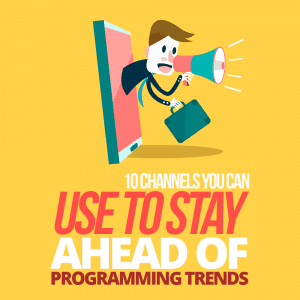 The only constant is change. And in the digital world, change comes swiftly—so quickly, in fact, that the next thing you know, you’re already left behind.
The only constant is change. And in the digital world, change comes swiftly—so quickly, in fact, that the next thing you know, you’re already left behind.
That is, if you allow yourself to miss out.
As a web developer, the desire to be kept in the zone of the latest programming trends should be an integral and inseparable part of yourself, especially if you intend to keep your career on track to survival.
But today’s technology has made it possible for a wide range of media platforms to bombard us with way, way more information than we can handle.
With over a billion websites in its inventory, the internet alone has such a colossal storage of information that typing “How much data is on the internet?” yields 598 million answers. All that in 0.49 seconds.
So, while your field demands that you keep yourself up-to-date with whatever is new, this extensive set of information providers can cause confusion between what’s reliable and what’s just pure product marketing.
That, certainly, is a dilemma.
Keeping up With Developer Trends
But don’t lose hope, yet. Mario Peshev shares in Quora some of his all-important tips to keep you informed about the latest happenings in the digital community. Here are 10 ways which may have led the guy from being your average web encoder to the CEO of WordPress development company DevriX.
1. Rub Elbows with Experts via Community Groups
Community memberships are filled with experts with whom you can share your passion for making the internet a better world. Aside from being part of a community that gives you a hand in cracking codes, community programs or forums can also help you keep your news inventory updated.
All jobs need to evolve at some point, and the pace in this industry is one of the fastest out there. New programming languages are introduced, an existing one gets updated, and a widely-used language may soon become obsolete.
True programmers do not stop learning. Your company might even expect this of you to stay on top of competition. If you fall behind, you may get replaced.
This is one of the greatest values of belonging to community groups—your news inventory will always be replenished.
One of these communities is Stack Overflow, which claims to be one of the largest web developer communities to date, servicing over 50 million visitors monthly. As the name suggests, it is inundated with question-and-answer threads with over 10 million questions raised and over 17 million answers provided.
You can also try the Google Developers Group if you are interested in learning more about Google’s technologies. The GDG platform offers mentorship that will help you grow individually while strengthening your network with other experts.
2. Experiment With Programming Trends
In building the core of your tech business model, whatever industry trend you read or hear about is worthless until you try it out, says CEO and co-founder of eZ Systems, Aleksander Farstad.
“Adapt if you want to survive,” the technologist said in his blog.
More importantly, victory will come to the first ones who execute innovations that cater to the fluctuating demand.
To get you started, here are some trends to watch out for this 2018.
3. Follow Blogs That Offer the Freshest of the Fresh
You need to stay on top of the latest news so your strategies will not be immediately rendered obsolete. This is especially true for this industry, where trends tend to come and go as technology develops. Reading blogs gives you the advantage of being one of the first in-the-know when something new comes up.
Some of the blogs you can keep in touch with are:
- Hacker News is a social news site with a focus on computer science and entrepreneurship.
- Slashdot is a site that publishes news stories on technology, science, and politics.
- DZone is an online community, tutorial hub, and news aggregator for software developers.
- Diginomica is a site that publishes stories for business leaders on digital enterprise, cloud apps and process, and technology disruptions.
- Product Hunt is a site that curates the latest trending mobile apps, websites, and technology products.
The effectiveness of honing your career path holds true for web developer Akash Kandal, who listed a collection of helpful blog posts to keep him updated with new coding tricks and styles for front-end developers.
4. While Away From the Screen, Listen to Podcasts
Thanks to their portability, podcasts are most helpful if you spend several hours a day on the road. Its on-demand format makes it time-efficient, as you can listen to one while doing other tasks.

A few web and software development podcasts you can start with include:
- Modern Web covers the latest news on EmberJS, ReactJS, AngularJS, ES2015, RxJS, and Functional Reactive Programming among others.
- The Big Web Show covers topics of web publishing, art direction, content strategy, typography, and web technology.
- The Web Ahead covers topics on developing technologies and the internet's future.
- HTTP 203 takes a general approach on web development, including life hacks and lessons.
- FiveJS covers the latest news on JavaScript in five-minute formats.
- Sitepoint Podcast discusses the nuances of web development and web design.
- The Changelog tells stories from a developer’s perspective, with topics ranging from AI to .Net to WordPress.
- Herding Code is a technology-focused weekly podcast.
5. Hit the Books for Some Words of Web Power
Although it seems that the information provided by a book may be outdated the moment it gets approved for publication, books can still offer fresh ideas in a comprehensive and more extensive approach compared to information found online. Reading books will help you leverage your skills and can lead you to build something new.
97 Things Every Programmer Should Know is a rich curation of programming practices and concepts beginners should take a note of; experts will also benefit from being reminded of the fundamentals.
Mobile Developer's Guide to The Galaxy is also a helpful guide to creating mobile apps. It offers tips in a step-by-step manner.
There are also other books recommended by web programmers that offer timeless ways for you to adopt habits that can lead to your success.
6. Take Online Courses
Contrary to the misconceptions, extensive training does not have to be expensive. There are several virtual courses that can stretch your knowledge further without any cost.
If you intend to land a job with a prestigious company or a blue-chip client, expect that they will want to know if you are familiar with the latest industry trends and if you have the capabilities to adapt.
When you continue to learn more via online classes, you increase your knowledge base, thereby increasing your productivity and positioning yourself as a huge asset to the business.
These online courses have topics ranging from all things web development, including HTML, CSS, Javascript, jQuery, Python, Ruby, PHP, and app building, among many others—all with theoretical and practical approaches.
One of the great things about online courses is that you have the flexibility to choose when you want to study, as opposed to attending a formal school with rigid schedules. Since a lot of these courses are free, you don’t have to shell out thousands of dollars for one; those that do come with a fee are often less expensive.
Coursera provides heavy-duty courses for both master and beginner levels. Courses are channeled through universities like Arizona State University and the University of Illinois Urbana-Champaign.
But for developers who can spare some financing for long-term growth, there are also several courses available online and offline.
7. Widen Your Network Through Conferences
The fantastic thing about conferences is that you learn through talks presented by experts while stretching your network.
Conferences can enhance your skills, since these events usually cover all the new ideas and approaches in your industry. You also have the added benefit of learning how to adapt to these trends, using tactics taught by the experts themselves.
Since a lot of these events allow you to walk up to industry authorities and strike up conversations, you will have the opportunity to meet people who may otherwise be out of your reach.
Lastly, with conferences, you can meet potential partners, prospects, and mentors—people who will be instrumental to your success.

For user experience-related conferences alone, there are more than 150 events to attend in 2018.
Open Mobile Summit, which is tagged as one of the biggest events this year, is a must-see for every app developer in the United States. In November this year, the event will record its 10th gathering of the most influential B2C brands, mobile-first companies, and app mega-hits across the country.
8. Widen Connections Through Social Media
Stay tuned-in to social media, because it gives you an easy and unified system of following tech industry leaders and platforms you follow elsewhere such as blogs, magazines, and communities.
These experts can share with you the tools of the trade, the technical know-how, as well as the latest news and trends. You will know firsthand what they are currently doing and how they successfully adapt to change. And as a bonus: They even share job openings that you can take advantage of.
Local tech groups or even international communities can help fill your social media feed with news and updates, all the while connecting with other peers interested in career growth and professional development.
By surrounding yourself with like-minded people set on one goal—that is, to succeed in the industry—you'll find a strong support system that you can turn to when a recent trend confuses you or when you simply need a morale boost.
Here are lists of app innovators you should start tracking on Twitter, LinkedIn, and Instagram. You can also check out some Facebook groups.
9. Learn From Tech Influencers Whom You Follow
It’s not enough if you just follow developers that you admire. It is also crucial to learn from and reach out to them through social media. By doing so, you will familiarize yourself with the daily grind these tech leaders go through.
Remember: they did not reach their current status without hard work and innovation. In a community that banks on thought- and resource-sharing , these industry leaders have positioned themselves at the top, because they are generous with sharing resources and experiential learnings.
If you intend to be like them in your future, retrace their steps—both the successes and the failures. Read their blogs, follow their social media accounts, and don’t hesitate to ask questions. Chances are, they welcome the engagement from people who want to learn from them.
However, all this theoretical knowledge will be for nothing if you do not act on it. Review all the lessons you learned, then find out how you can apply these to further your own career path.
10. Mingle with Colleagues
While this is more of a motivational driver, there are advantages to mingling with coworkers.
For one, you will get more resources that can help hone your skills. Your colleagues may also offer additional and more hands-on help in your codes compared to the virtual forums you engage in.
Chances are, your co-workers are also updated with the latest web development news. You can either learn from them or exchange ideas with them.
Read, read, read
Based on our to-do list, boosting your following, expanding your network, and filling your insatiable appetite for all things new are the main practices to enlighten yourself with fresh ideas.
It’s just a matter of surrounding yourself with every forum possible that promotes these values. In this case, everything from social media to books that offer new ideas should be welcomed as a resource toward progress.
